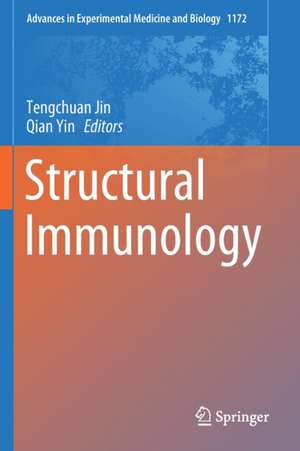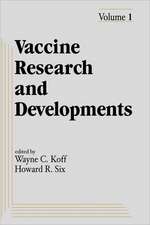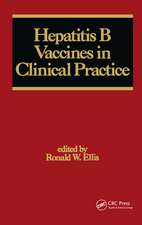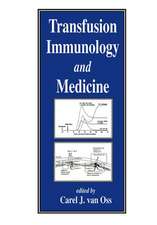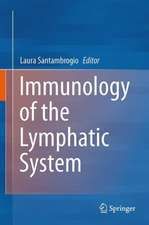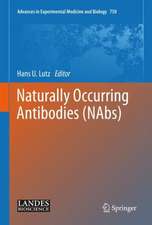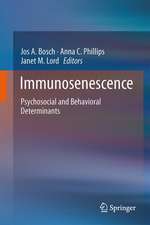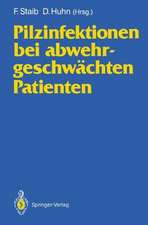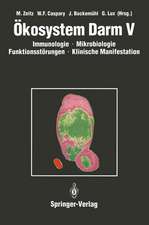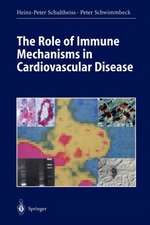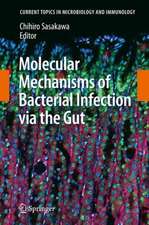Structural Immunology: Advances in Experimental Medicine and Biology, cartea 1172
Editat de Tengchuan Jin, Qian Yinen Limba Engleză Paperback – 31 oct 2020
| Toate formatele și edițiile | Preț | Express |
|---|---|---|
| Paperback (1) | 1028.27 lei 6-8 săpt. | |
| Springer Nature Singapore – 31 oct 2020 | 1028.27 lei 6-8 săpt. | |
| Hardback (1) | 1035.18 lei 6-8 săpt. | |
| Springer Nature Singapore – 31 oct 2019 | 1035.18 lei 6-8 săpt. |
Din seria Advances in Experimental Medicine and Biology
- 9%
 Preț: 719.60 lei
Preț: 719.60 lei - 20%
 Preț: 691.93 lei
Preț: 691.93 lei - 5%
 Preț: 717.00 lei
Preț: 717.00 lei - 5%
 Preț: 716.28 lei
Preț: 716.28 lei - 5%
 Preț: 717.20 lei
Preț: 717.20 lei - 15%
 Preț: 640.24 lei
Preț: 640.24 lei - 5%
 Preț: 1113.83 lei
Preț: 1113.83 lei - 5%
 Preț: 715.71 lei
Preț: 715.71 lei - 5%
 Preț: 820.43 lei
Preț: 820.43 lei - 15%
 Preț: 641.38 lei
Preț: 641.38 lei - 5%
 Preț: 716.28 lei
Preț: 716.28 lei - 5%
 Preț: 523.99 lei
Preț: 523.99 lei - 5%
 Preț: 1031.00 lei
Preț: 1031.00 lei - 5%
 Preț: 717.00 lei
Preț: 717.00 lei - 5%
 Preț: 715.35 lei
Preț: 715.35 lei - 20%
 Preț: 1161.71 lei
Preț: 1161.71 lei - 5%
 Preț: 1170.51 lei
Preț: 1170.51 lei - 18%
 Preț: 1119.87 lei
Preț: 1119.87 lei - 5%
 Preț: 1288.48 lei
Preț: 1288.48 lei - 5%
 Preț: 1164.67 lei
Preț: 1164.67 lei - 5%
 Preț: 1101.73 lei
Preț: 1101.73 lei - 18%
 Preț: 1123.67 lei
Preț: 1123.67 lei - 5%
 Preț: 1435.64 lei
Preț: 1435.64 lei - 20%
 Preț: 1044.10 lei
Preț: 1044.10 lei - 18%
 Preț: 946.39 lei
Preț: 946.39 lei - 5%
 Preț: 292.57 lei
Preț: 292.57 lei - 18%
 Preț: 957.62 lei
Preț: 957.62 lei - 18%
 Preț: 1235.76 lei
Preț: 1235.76 lei - 5%
 Preț: 1231.55 lei
Preț: 1231.55 lei - 5%
 Preț: 1292.30 lei
Preț: 1292.30 lei - 5%
 Preț: 1102.10 lei
Preț: 1102.10 lei - 18%
 Preț: 1132.81 lei
Preț: 1132.81 lei - 5%
 Preț: 1165.19 lei
Preț: 1165.19 lei - 5%
 Preț: 1418.48 lei
Preț: 1418.48 lei - 5%
 Preț: 1305.63 lei
Preț: 1305.63 lei - 18%
 Preț: 1417.72 lei
Preț: 1417.72 lei - 18%
 Preț: 1412.99 lei
Preț: 1412.99 lei - 24%
 Preț: 806.16 lei
Preț: 806.16 lei - 18%
 Preț: 1243.29 lei
Preț: 1243.29 lei - 5%
 Preț: 1429.44 lei
Preț: 1429.44 lei - 5%
 Preț: 1618.70 lei
Preț: 1618.70 lei - 5%
 Preț: 1305.12 lei
Preț: 1305.12 lei - 18%
 Preț: 1124.92 lei
Preț: 1124.92 lei - 5%
 Preț: 1097.54 lei
Preț: 1097.54 lei - 15%
 Preț: 649.87 lei
Preț: 649.87 lei - 5%
 Preț: 1097.54 lei
Preț: 1097.54 lei - 18%
 Preț: 945.79 lei
Preț: 945.79 lei - 5%
 Preț: 1123.16 lei
Preț: 1123.16 lei
Preț: 1028.27 lei
Preț vechi: 1082.38 lei
-5% Nou
Puncte Express: 1542
Preț estimativ în valută:
196.79€ • 204.69$ • 162.46£
196.79€ • 204.69$ • 162.46£
Carte tipărită la comandă
Livrare economică 14-28 aprilie
Preluare comenzi: 021 569.72.76
Specificații
ISBN-13: 9789811393693
ISBN-10: 9811393699
Pagini: 226
Ilustrații: XIII, 226 p. 86 illus., 84 illus. in color.
Dimensiuni: 155 x 235 mm
Greutate: 0.35 kg
Ediția:1st ed. 2019
Editura: Springer Nature Singapore
Colecția Springer
Seria Advances in Experimental Medicine and Biology
Locul publicării:Singapore, Singapore
ISBN-10: 9811393699
Pagini: 226
Ilustrații: XIII, 226 p. 86 illus., 84 illus. in color.
Dimensiuni: 155 x 235 mm
Greutate: 0.35 kg
Ediția:1st ed. 2019
Editura: Springer Nature Singapore
Colecția Springer
Seria Advances in Experimental Medicine and Biology
Locul publicării:Singapore, Singapore
Cuprins
Structural basis for signalling through shared common g chain cytokines.- MHC Molecules, T Cell Receptors, Natural Killer Cell Receptors, and Viral Immunoevasins–Key Elements of Adaptive and Innate Immunity.- Structures of Immune Checkpoints: An Overview on the CD28-B7 Family.- Interleukin-10 family cytokines immunobiology and structure.- Structural insights into the interleukin-17 family cytokines and their receptors.- Structural biology of NOD-like receptors.- AIM2 Inflammasome Assembly and Signaling.- Structures of RIG-I-like receptors and insights into viral RNA sensing.- Structural Insight of Gasdermin Family Driving Pyroptotic Cell Death.- NF-κB, IκB, and IKK: Integral Components of Immune System Signaling
Notă biografică
Dr. Tengchuan Jin is a Professor at the First Affiliated Hospital of USTC, Division of Life Sciences and Medicine, University of Science and Technology of China (USTC). He holds a Ph.D. degree from the Illinois Institute of Technology and completed his postdoctoral training at the Laboratory of Immunology, National Institute of Allergy and Infectious Diseases (NIAID), National Institutes of Health (NIH), USA. His current research interests include the structural biology of the innate immune receptors, structure and function of inflammasome, molecular mechanism of microbe-host interactions, protein engineering and antibody drug development, and he has published more than 50 research articles in these fields.
Dr. Yin Qian is currently an Assistant Professor at the Department of Biological Science, Florida State University. She received her Ph.D. degree from Cornell University and completed her postdoctoral training at Cornell University and Harvard Medical School underProf. Hao Wu, a well-known structural immunologist. Dr. Qian's research interests include the activation mechanism of interferon-inducible GTPases and regulatory mechanisms of Rag GTPases in autophagy. She has published a series of high-profile research articles in the field of structural immunology.
Dr. Yin Qian is currently an Assistant Professor at the Department of Biological Science, Florida State University. She received her Ph.D. degree from Cornell University and completed her postdoctoral training at Cornell University and Harvard Medical School underProf. Hao Wu, a well-known structural immunologist. Dr. Qian's research interests include the activation mechanism of interferon-inducible GTPases and regulatory mechanisms of Rag GTPases in autophagy. She has published a series of high-profile research articles in the field of structural immunology.
Textul de pe ultima copertă
This book presents a comprehensive overview of important immune molecules and their structure-function relationships. The immune system is highly complex, consisting of a network of molecules, cells, tissues and organs, and the immune reaction is involved in various physiological as well as pathological processes, including development, self-tolerance, infection, immunity, and cancer. Numerous molecules participate in immune recognition, inhibition and activation, and these important immune molecules can be roughly divided into cell surface receptors, intracellular receptors and intracellular signaling molecules. The study of how these immune molecules function at molecular level has laid the foundation for understanding the immune system. The book provides researchers and students with the latest research advances concerning the structural biology of key immune molecules/pathways, and offers immunologists essential insights into how these immune molecules function.
Caracteristici
Presenting a comprehensive overview of important immune molecules and their structure-function relationships Providing researchers and students with the latest research advances concerning the structural biology of some key immune molecules/pathways Offering immunologists essential insights into how these immune molecules function
